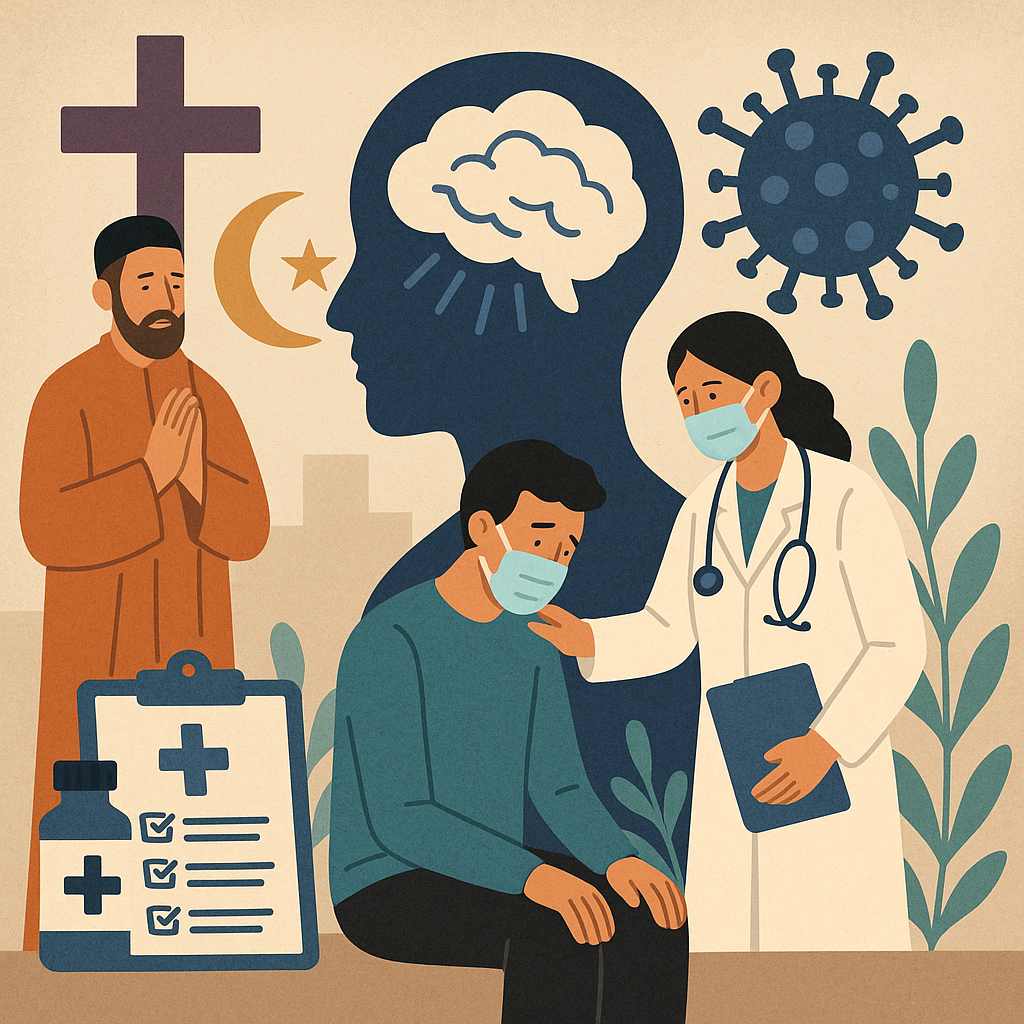Religion and Healthcare: Faith-Based Responses to Pandemics & Mental Health
Religion and healthcare have long been intertwined in India, where faith and healing often share the same space. From ancient Ayurvedic traditions rooted in Hindu philosophy to the compassion-based service of Christian and Islamic institutions, religion has historically played a central role in public health. The COVID-19 pandemic, however, brought this relationship into sharp focus once again — showing both the potential and the challenges of faith-based responses to crises. Today, as the country faces not just physical but also mental health challenges, religious organizations and beliefs continue to influence how people cope, recover, and build resilience.
Faith and Public Health in Times of Crisis
During the COVID-19 pandemic, faith-based organizations emerged as frontline actors across India. Temples, mosques, gurdwaras, and churches became not just places of prayer but also centers of relief work. The Golden Temple in Amritsar, for instance, continued its langar (community kitchen) services, feeding thousands daily even during lockdowns. Similarly, many Muslim groups organized oxygen and food supplies, while Christian missions converted schools and hospitals into care centers.
These efforts highlighted how religious communities could mobilize trust, volunteers, and local networks faster than many bureaucratic institutions. Faith leaders, with their moral authority, also played a vital role in spreading awareness about vaccination, hygiene, and social distancing — translating scientific advice into culturally resonant messages. In rural India especially, where health infrastructure was weak, such faith-based initiatives often filled the gap between government services and community needs.
Spiritual Coping and Psychological Resilience
Beyond physical health, pandemics test emotional endurance. The isolation, uncertainty, and grief triggered by COVID-19 led to a surge in anxiety, depression, and trauma. Here, too, religion became a crucial psychological anchor. Faith-based practices such as prayer, meditation, chanting, and seva (selfless service) offered people a sense of control and comfort amid chaos.
Spiritual leaders encouraged mindfulness and gratitude as antidotes to despair. Many online satsangs, virtual namaz congregations, and church live-streams helped believers maintain a sense of community even when physical gatherings were impossible. The rituals and symbols of faith provided continuity in a world that felt uncertain. Psychologists now increasingly recognize the role of spiritual belief as a “protective factor” for mental health — helping people find meaning in suffering, and fostering hope during recovery.
Mental Health Stigma and Faith-Based Counseling
In India, mental illness has long carried stigma. People are often reluctant to seek psychiatric help, fearing social judgment or spiritual condemnation. However, religious leaders have begun to challenge these taboos. Some Hindu ashrams now include yoga-based therapy for stress and depression; Buddhist centers promote mindfulness as a path to emotional balance; Islamic scholars emphasize that seeking medical help for mental distress is not a sign of weak faith but a responsible act of self-care.
Christian and Sikh institutions have also developed counseling programs that integrate scripture with modern psychology. For example, Christian hospitals in southern India run “pastoral counseling” programs, combining prayer with talk therapy, while Sikh gurdwaras in Canada and Punjab have launched helplines for youth mental health. This blend of spiritual and psychological support is helping communities approach mental illness with compassion instead of shame.
Challenges and Ethical Concerns
Despite these successes, the intersection of religion and healthcare is not without controversy. At times, faith-based interpretations of illness can lead to misinformation or resistance to scientific advice. During the pandemic, some fringe groups opposed vaccines or promoted “spiritual immunity” as a replacement for medical care. Ensuring that religious responses align with evidence-based healthcare remains an ongoing challenge.
Moreover, inclusivity is key. Faith-based healthcare should serve people of all beliefs without discrimination. India’s pluralistic ethos demands that religious compassion extend beyond sectarian boundaries — as seen in interfaith relief efforts during crises. For religion to remain a constructive force in healthcare, it must balance devotion with scientific literacy and empathy with equality.
The Way Forward: Integrating Faith with Modern Medicine
The pandemic taught policymakers that community trust is as vital as medical infrastructure. Governments and health agencies can benefit from collaborating with faith institutions that already possess deep local roots. For example, training religious leaders in basic public health communication or mental health first aid can help bridge the gap between science and society.
In the post-pandemic era, mental health will remain a growing concern — especially for youth and vulnerable groups. Faith-based approaches can complement professional therapy by offering emotional grounding, ethical guidance, and social connection. The goal is not to replace medicine with spirituality, but to integrate both into a holistic model of healing that addresses body, mind, and soul together. Religion and healthcare in India share a living relationship — one that has evolved from traditional healing to modern humanitarianism. In times of pandemics and mental health crises, faith can either divide or unite, mislead or heal. The most powerful outcomes occur when faith becomes a bridge — linking the human need for meaning with the scientific quest for wellness. As India continues to navigate the complexities of modern healthcare, its diverse spiritual traditions can offer more than comfort — they can inspire collective resilience, ethical service, and compassionate care for all.
~Religion World Bureau










